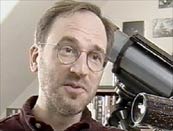Is Star Trek science so appealing to everybody because people are disillusioned with the slow pace of the space programme in real life?
 That interesting question. In the 1960s, when we were shooting the original series, obviously that was the heyday of the American space programme. The Apollo missions were being designed and developed and it was, I think a month or two after Star Trek aired its last episode of the original series that Neil Armstrong set foot on the moon. So the 1960s were clearly a time when people thought the possibilities for space exploration were endless.
That interesting question. In the 1960s, when we were shooting the original series, obviously that was the heyday of the American space programme. The Apollo missions were being designed and developed and it was, I think a month or two after Star Trek aired its last episode of the original series that Neil Armstrong set foot on the moon. So the 1960s were clearly a time when people thought the possibilities for space exploration were endless.
When Neil Armstrong set foot on the moon in 1969, most scientists and engineers would have told you that by 1980, we�ll be walking on Mars. And by the 21st Century we may be sending people to stars orbiting other planets. It was a time of extraordinary technical development. I had a piano teacher when I was a little boy who was 21 years old when the Wright Brothers flew at Kittyhawk. She lived to see see men walk on the moon. That�s astonishing, that�s an astonishing pace of technical advancement.
What people didn�t expect was that that technical advancement would sort of stall out after the Apollo missions. And it�s remarkable that no human being has set foot on the moon in nearly 30 years. We have certainly not gone farther. And it�s sad and I think � a lot of people are disappointed. Star Trek at least fills the void in the imagination that has been has been left by the fact that the space programme essentially stopped at the moon and it�s going to be some years, in all probability, before we go forward: either back to the moon or on to Mars.
